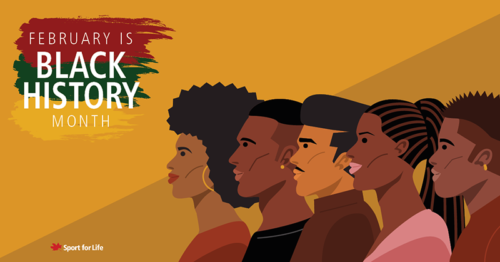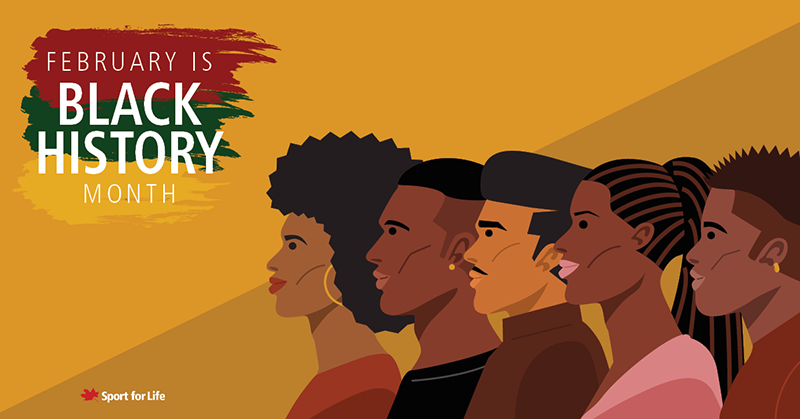Sport for Life celebrates the achievements of Black participants and reflects on Canada’s storied past during Black History Month

There’s so much to learn about, to celebrate, and to grow from.
Every year, Black History Month is an opportunity to elevate the accomplishments of Black participants in sport and physical activity, and to learn about their impact on Canadian culture. From Barbara Howard becoming the first Black female to represent Canada at an international competition in 1938 to Donovan Bailey winning the gold medal at the 1996 Olympics, these larger-than-life characters are an inspiring part of Canada’s legacy.
More recently, sprinter Andre de Grasse earned six Olympic medals while Damien Warner took home the 2020 Olympic gold medal for heptathlon following his seventh time being named world champion. More recently, sprinter Andre de Grasse has earned six Olympic medals, while Damian Warner took home the 2020 Olympic gold medal for the decathlon. Meanwhile, Team Canada’s soccer team, which has a strong contingent of Black players, qualified for the World Cup after a 36-year drought.
These are just a few of the impressive achievements of Black participants, many of whom had to overcome systemic barriers and hurdles that others didn’t. Here are some links to learn more about Black Canadian participants throughout history:
- Black Canadian Athletes | The Canadian Encyclopedia
- Black athletes who made Olympic sport history in Canada – Official Olympic Team
- Black History Month: These trailblazing Black athletes transformed Canadian sports (theconversation.com)
Because of the many Black participants who have achieved excellence throughout Canada’s history, aspiring players have many role models to look up to. Hailing from all kinds of different sports, these figures demonstrate the power of resilience and determination. Keeping their memories alive is an important part of Black History Month. Below we’ve listed a few of the most notable names:
At Sport for Life, we’re committed to creating a quality sport and physical literacy ecosystem that is committed to opposing anti-black racism. We strive to create a welcoming and inclusive environment for Black participants, and implementing a Long-Term Development in Sport and Physical Activity framework will help ensure everyone gets an opportunity to both participate and excel. Below we’ve listed some of the organizations that are taking on this work to ensure a brighter future for Black excellence.
- Black in Sports Business
- Black Rock Initiative
- The Black Canadian Coaching Association launches Black Indigenous People Of Coulour Hockey Coach Mentorship Program, powered by the NHL and NHLPA
Here are some resources, in no particular order, that can support learning and unlearning more about the role of physical literacy in the lives of Black participants and the importance of eradicating systemic racism as we work our way towards a more inclusive sport system and society.
- Anti-Racism Resources | AthletesCAN
- The Sporting Experiences of BIPOC Women & Girls in Canada | Canadian Women & Sport (womenandsport.ca)
- Team Canada Athletes Raise their Voices Against Racism – Team Canada – Official Olympic Team Website
- Webinar: Actionable ways to address anti-Black racism & police violence through public health practice | National Collaborating Centre for Determinants of Health (nccdh.ca)
- How We Give (mlsefoundation.org)
- Black Lives Matter Canada
- Social determinants and inequities in health for Black Canadians: A Snapshot – Canada.ca
- Black History Month Resources: Approaches, Identities, Histories, Legacies & Inclusion (facinghistory.org)
In the spirit of Kaizen, a Japanese concept that means continuous self-improvement, Sport for Life works toward learning and unlearning about Black Canadian history and systemic racism in this country. The resources and articles above are a small collection of the valuable information and work being done by so many to help offer insight, perspective and education in this space.
“Black History Month is a powerful way to keep the stories of those who came before us alive. Not only do they amaze us with their athletic achievements, they also inspire us with the ways they’ve lived their lives and contributed to our society in impactful ways,” said Billie Tes, Manager of People and Culture at Sport for Life.
“Every February we get to be a small part of keeping their legends alive and making their names known, while reminding Canadians about the importance of developing physical literacy and providing trajectories to success for everyone.”


